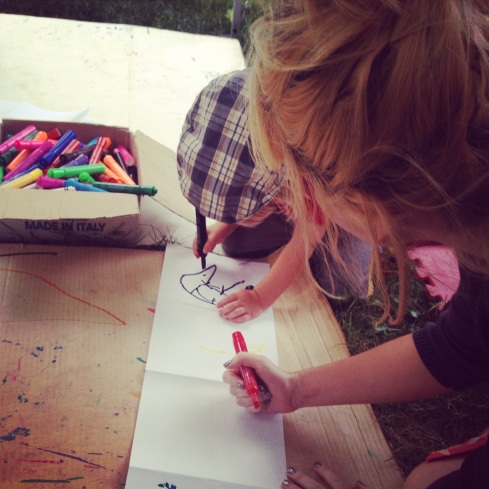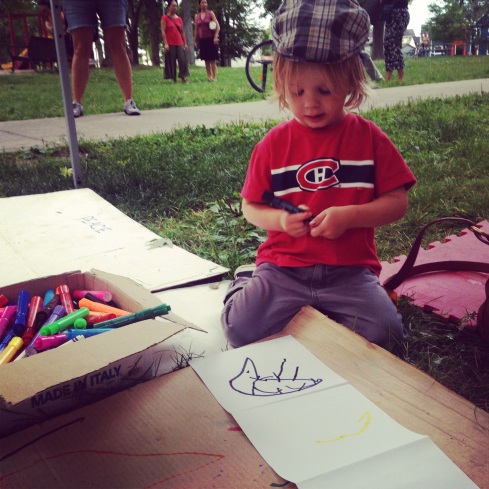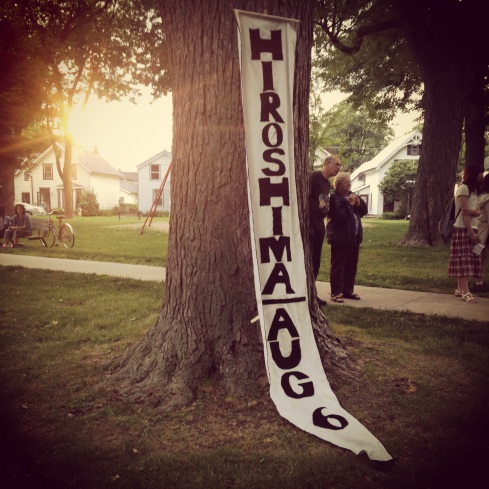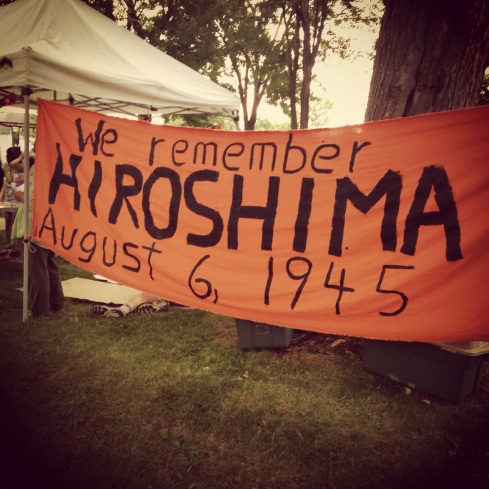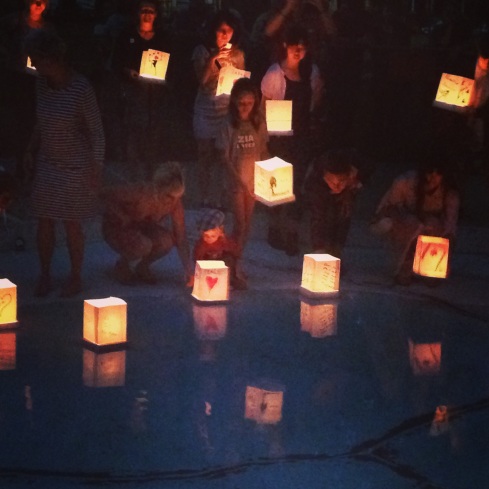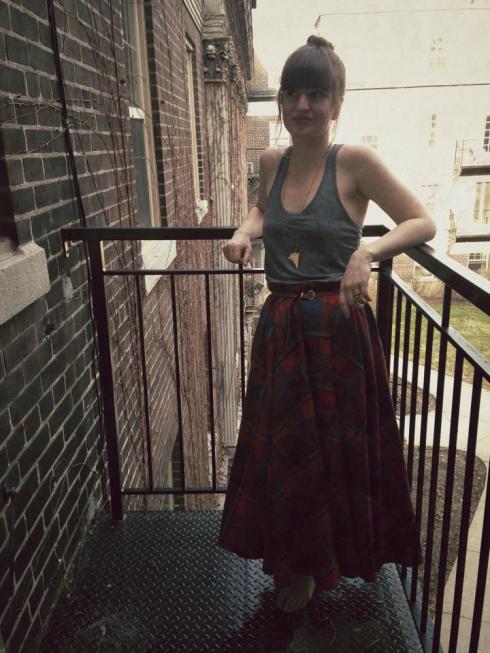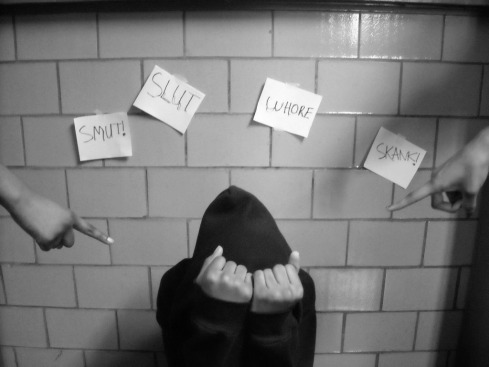TW: talk of suicide, body size, dieting
It’s the beginning of a new year, which means that I’ve been seeing lots of posts on social media about resolutions for 2015 and, as always, one of the dominant themes is health. I’ve seen a lot of promises to bike to work, to eat healthier, to get a gym membership, and so on and so forth. I used to make resolutions like these, although mine were almost always unhealthy and centred around weight loss. I would frame them as “feeling better in my body,” but really what I meant was, “exercise and withhold foods I love until my body is a size that makes me feel good about myself.” Turns out that magical just-beyond-the-horizon body size doesn’t actually exist, and the methods I used to try to get there were dangerous, unsustainable, and made me feel like garbage.
I’m not saying that making resolutions about your own body is wrong; I’m just saying that they aren’t positive for me, personally. So this year instead of having goals for my physical health, I’m going to make goals for my mental health. After all, that aspect of my well-being needs more attention these days than my body itself; I’m also hoping that focussing more on my mental state will help me to be kinder to my body. Hopefully it’ll be a win for all the players of Team Thériault!
So here are my resolutions for 2015:
1. Take my medication every day, no excuses
I take what sometimes seems like a lot of meds – prescription iron pills for my buzz-kill anemia, Zoloft for anxiety, a tiny dose of Seroquel as an adjunct mood booster and Imovane, the tiny blue angel that floats me off to dream country every night. Now, naturally I’m GREAT at remembering to take my sleepy time pills at the end of the day because a) they make me feel good and b) I’m a hot insomniac mess without them. I’m less amazing when it comes to consistently taking the rest of my drugs. I really have no excuse NOT to be amazing about the Zoloft and the iron pills, because I own at least two fancy pill boxes: an elegant-lady-who-takes-Xanax-with-her-tea style box from my friend Audra, and a box with a Russian cosmonaut theme from my friend CJ. In 2015, I will travel with these boxes fully stocked at all times. I will also remember to use my full spectrum lamp every day – again, I have no good excuse not to use it, since I can set it up anywhere and get some work done while it beams sunshine deep into my cold, briny soul.
2. Be more consistent about therapy
I mean, I always go to my therapist’s office, but I don’t always go to therapy, if that makes sense. I phone it in a lot of the time – as someone who can talk forever about the most unimportant subjects, I’m really good at making my therapy sessions all filler and no killer, and often when we start to edge into scary feelings territory, I bail hard. This makes me feel like I’m doing this tepid sort of I’m-working-through-my-stuff-but-not-really dance, one where I spend more time balking and shying away than actually confronting my shit. This year I want to learn to how to better work through the balking so that I can get to the stuff that matters.
3. Check in more often with the people I love (and who love me)
I need to be better about checking with my friends and family – even if it’s just sending little text messages telling them that I love them and value them. When things start to go sideways mental health-wise, one of the first things I do is sequester myself from the people around me, which of course only amplifies the misery I’m feeling. It’s a vicious cycle – I feel awful and think I’m a terrible person, and I don’t want to subject others to my terribleness so I stop talking to them, and then this social isolation just confirms everything bad I believe about myself. This year I’m going to make more of a conscious effort to check in with the people I care about, both because it will make me a more awesome friend and also because it’s a healthier way for me to be.
4. Ask for help when I need it
Whenever my depression is bad, and especially once i’ve hit the slippery slope of suicidal ideation, I get to a place where I just can’t do it on my own anymore. Which is a very human thing, because humans are social creatures, and there’s a reason cave men lived in packs or whatever – we’ve evolved to need each other and rely on each other. The problem is that I really, really hate asking for help – not because I’m a noble solitary warrior or anything like that, but because I’m afraid that no one will care enough about me to help, or else that I’ll be taking advantage of my friends, or, worst of all, that people will help and I’ll still feel just as bad as ever. I know that none of it is rational, but when I get to a state of bone-gnawing sadness all reason goes out the window. Which is why I need to make plans and change my behaviour now, while I’m feeling relatively stable, instead of waiting until things are the Absolute Worst before trying to fix my life.
One thing on this front that I’ve found really useful has been asking for specific types of help – help with childcare, help with cleaning, help with food preparation, or even just help in the form of pep talks or hugs to keep me going when the going gets tough. I’ve also learned that it helps to be clear about what I want/need when I’m feeling down about something – sometimes I’m not in a place to process advice, and clarifying for my friends that I’m looking for comfort and commiseration only means that we all avoid frustrating interactions.
5. Learn to say no
See also: learn to budget my time better, learn to better estimate how long a given task will take, learn to set firm interpersonal and professional boundaries, and learn not to take on every writing gig that comes my way.
I seem to have this weird belief that Corey Mason‘s dad was right and there are, in fact, 24 usable hours in ever day (even though when Corey tried to follow this advice she wound up becoming a speed addict, but I digress), so I stupidly keep adding stuff to my calendar until I barely have time to breathe. I think I’m worried that if I start turning down opportunities, then no one will ever ask me to do anything ever again, but that’s just not true. I’m going to practice saying no in the politest, firmest, most I’m-incredibly-flattered-you-asked-me-but-I’m-super-busy, let’s-do-this-another-month-instead-of-tomorrow sort of way.
In a similar vein, I’m going to try to only take on paid writing gigs this year. I’m not going to write for “exposure” anymore, and if I do something for free it will be because it’s a cause I believe in, and to which I really want to lend my voice. My time is valuable, my thoughts are valuable, and my landlord won’t accept “exposure” in lieu of a rent cheque.
6. Be more consistent about applying skills I learned in cognitive behavioural therapy
Cognitive behavioural therapy was the SHIT. I took away more concrete skills from the handful of months I spent in the CBT program at CAMH than probably any other therapy I’ve ever had in my life. When I can manage to breathe deeply, evaluate what I’m thinking/feeling and ask myself if it’s a logical reflection of what I’m actually experiencing, it becomes much easier to squelch an oncoming meltdown. Of course, I don’t always remember/feel capable of using my CBT skills when I’m mid panic-attack. What I need to do is start practicing these mind-tricks when things are less critical, so that implementing them becomes a habit and feels less like a mental workout.
7. Learn to better live in my body and not just with my body
I have this habit of treating my body like a mostly useless bipedal meat vehicle for my brain, by which I mean there’s a part of me that honestly believes that my body only exists to transport my beautiful mind from place to place. This can lead to me feeling like I’m not so much living in my body as I am grimly tolerating my body. This year I’m going to try to actually love my body – the way it looks, how it moves, the rad things it does – rather than treating it as if its only value lies in its utility. Because not only is that view pretty unkind to myself, it’s also very ableist. Bodies aren’t just good because they can do things – they’re good because they exist, and they’re us, and we have value as people.
8. Become better at identifying my mental state
Identifying my breathless, sobbing, oh-god-the-world-is-ending meltdowns as actually being panic attacks was a huge turning point for me in 2014. I went from thinking that I am just this bad person who can’t control their emotions to recognizing that this is an actual thing that is happening, a thing that has a name and has been described by other people and is generally recognized by doctors and lay-folk alike. This gave my panicked weeping on public transit a sort of validity that it had been lacking, and made it seem more like a solvable problem and less like a huge personal flaw. I’m not saying that this is something that will help everybody, and I don’t mean to imply that there’s anything wrong having meltdowns on buses that aren’t panic attacks, but for me, personally, this has been really useful.
I also think that in general I need to be better at identifying what I’m feeling and, if applicable, why. Sometimes even just naming things makes them easier to handle, you know?
9. Practice self-care
I pay a lot of lip service to self-care, but I’m not always the greatest at practicing it myself. This year I’m going to make sure I have more downtime, more comforting rituals, and more ways of recharging. My friend Audra has a self-care chalkboard that reminds her to do things she enjoys and that are good for her specific body – stuff like swimming, hula hooping, and drinking tea – and I think I’m going to steal her idea. I need to remember to use my me-time for stuff that I love and that rejuvenates me, rather than wasting it refreshing my Facebook page 50,000 times in a row.
10. Be kinder to myself
This is definitely the hardest one, because my natural inclination is to treat myself like garbage. I’m the type of person who’s always ready with a laundry list of all my worst qualities, and my ability for negative self-talk is unparalleled. I don’t just sell myself short – I’ll argue with you about why and how I’m a complete waste of money, time and space. But this year, that’s going to start changing.
My goal for 2015 is to give myself as much love, patience and understanding as I would lavish on the folks I care about. If I can treat other people decently, then surely I can do the same thing to myself? This is going to be the year of giving myself the benefit of the doubt, going easy on myself when I fuck up, and giving myself more space to breathe.
Happy 2015, y’all




